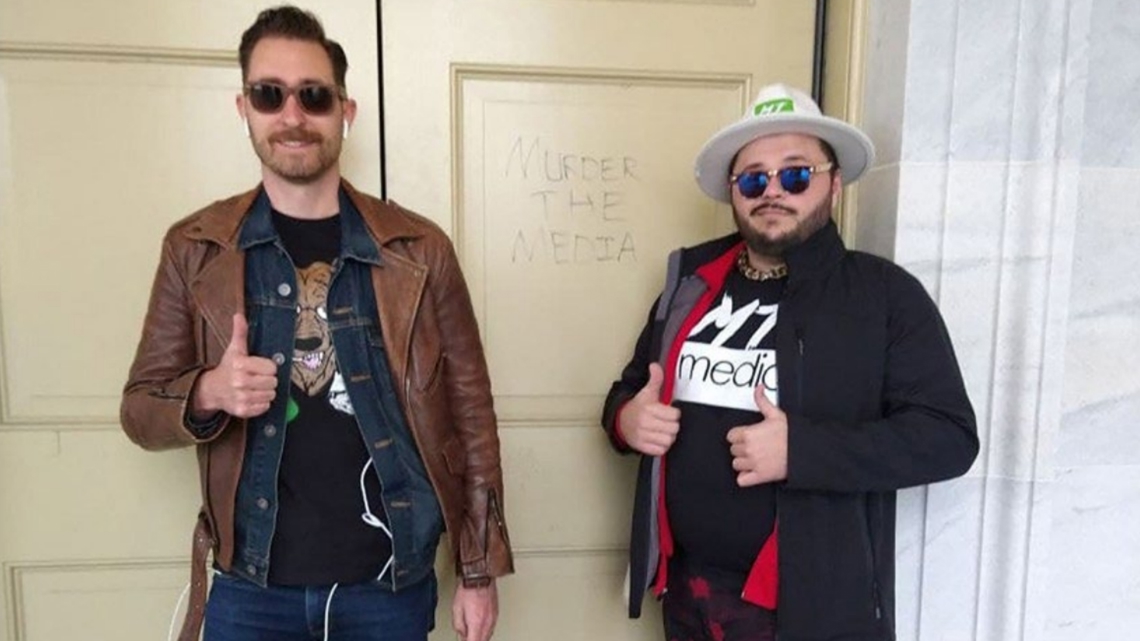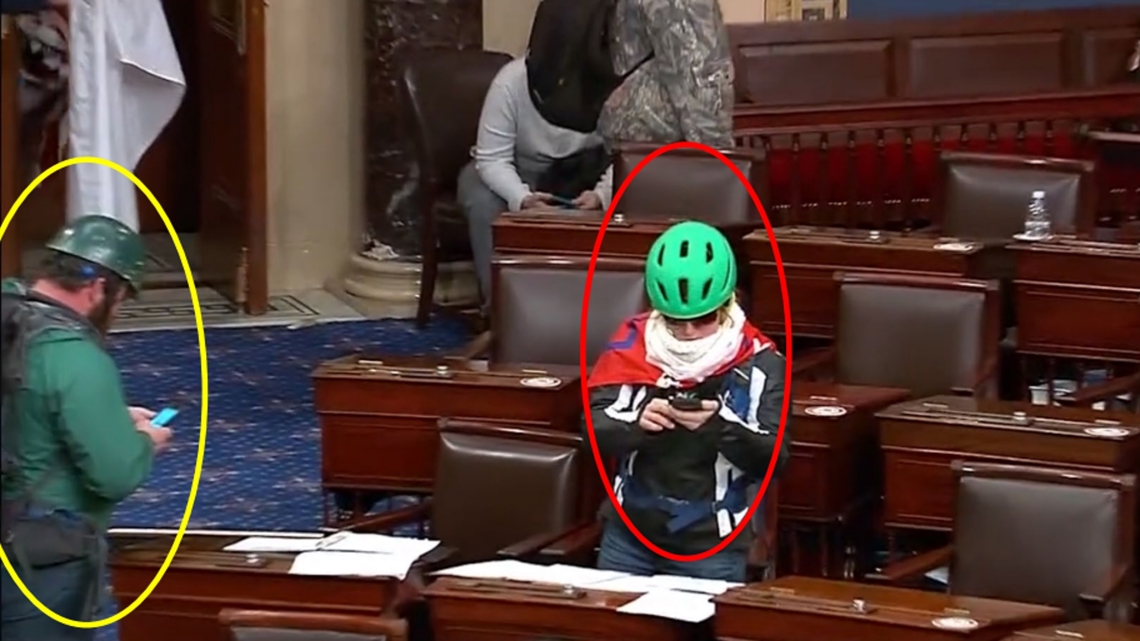The Justice Department is asking judges to uphold convictions for Capitol rioters who pleaded guilty to obstructing the joint session of Congress.
WASHINGTON — Federal prosecutors say convictions for dozens of Jan. 6 defendants who pleaded guilty to obstructing the joint session of Congress shouldn’t be vacated – even after the U.S. Supreme Court ruled earlier this year the Justice Department had read the statute too broadly.
In June, the nation’s highest court said defendants charged with obstruction of an official proceeding must have taken some action that "impaired the availability or integrity for use in an official proceeding of records, documents, objects, or... other things used in the proceeding, or attempted to do so." The 6-3 ruling found federal prosecutors had improperly treated the statute, which was passed as a package of reforms in the wake of the Enron scandal, as a “catch-all” provision instead of one more narrowly tailored to prevent evidence tampering.
Since the court’s ruling, prosecutors have moved to dismiss the charge – 18 U.S.C. § 1512(c)(2) – from a number of pending indictments and have, in some circumstances, not opposed release pending appeal for defendants already sentenced after being convicted at trial.
For defendants who entered into a plea agreement, however, prosecutors are urging judges not to undo their convictions.
According to a WUSA9 analysis of Justice Department sentencing data, at least 35 people have pleaded guilty to the obstruction count and been sentenced. For the vast majority, all other remaining charges were dropped as a condition of their plea.
Standard federal plea language used in nearly all, if not all, Jan. 6 cases requires defendants to waive their rights to appeal their conviction on any basis, including claims that “(1) the statute(s) to which your client is pleading guilty is unconstitutional, and (2) the admitted conduct does not fall within the scope of the statute(s).” It also requires them to waive their rights to collateral attack, or the ability to challenge their conviction outside of the normal appeals process.
That waiver includes the right to challenge their conviction by filing what's called a 2255 motion to vacate – exactly the motion some Jan. 6 defendants who’ve entered guilty pleas have now filed. But according to legal experts WUSA9 spoke to, even with the Supreme Court’s decision some Jan. 6 defendants may have a tough time unwinding the plea deals they entered.
“If I had a client in that situation, I would be looking for some way to challenge that restriction,” defense attorney Peter Goldberger said, “but I wouldn’t expect to win.”
Goldberger, a Philadelphia-based defense attorney and former criminal law professor, has more than 40 years of experience handling federal criminal appeals. He said defendants who entered into plea deals with the collateral attack waiver may have to show it wasn’t knowing and voluntary or that they did so due to ineffective assistance of counsel. Doing that may be hard, since dozens of defendants, represented by just as many attorneys, entered into similar pleas even after a judge in the same district had already dismissed the obstruction count in question.
“The criminal legal system highly values finality. It places a high value on finality,” Goldberger said. “Arguably higher than the value it places on justice or legality. But, in any event, it competes with the values of legality and justice.
“For example, once your case has reached the point of a judgment and the time during which you could bring an appeal is ended, the judgment becomes final,” Goldberger said. “And the system makes it hard to overcome that. If I’m being objective about it and not just wearing my criminal defense hat, I would say for good and understandable reasons. There are thousands – tens of thousands – of new criminal defense cases every year. And if none of them were ever considered closed, the system would break down quite quickly.”
Last month, two members of the Proud Boys were among the first wave of Jan. 6 defendants to seek to have their convictions vacated. Nicholas Ochs, an “elder” member of the group who held a senior leadership role, and Nicholas DeCarlo, a former third-degree Proud Boy, both pleaded guilty in 2022 to a single count of obstruction of an official proceeding and were sentenced to four years in prison. A little more than a week after SCOTUS’ ruling, an attorney representing both men asked a federal judge to release them from prison and, ultimately to vacate their convictions.


In a filing last week opposing their release, prosecutors said the plea agreement they each entered was a contract they shouldn’t now be allowed to back out of.
“In exchange for their guilty plea to a single count, the government dismissed or did not bring several other charges of equal or greater seriousness against them,” prosecutors wrote. “That was the bargain these defendants struck: they chose to limit their exposure and obtain finality rather than continue to press their case. Courts, including the D.C. Circuit, have declined to undo such waivers based on arguments that the law later changed or that the district court got the law wrong. They have recognized that enforcing such waivers benefit both parties by allowing defendants to use their appellate and collateral review rights as leverage and receive benefits in exchange. This Court should do the same.”
Prosecutors said appellate courts around the country, including the 2nd, 6th, 7th and 9th Circuits, have upheld collateral attack waivers under similar circumstances. And though the D.C. Circuit hasn’t ruled on the issue, prosecutors said a 2023 ruling that upheld a waiver of the right to appeal suggests they would take the same approach to collateral attack waivers.
Ochs and DeCarlo aren’t alone in filing their motions. Numerous defense attorneys have now asked judges to swiftly move to correct plea deals they argue are now unconstitutional. Some, like attorney William Shipley, who filed one of the first motions to vacate last month for his client Tara Stottlemyer, have also blasted the DOJ for “stalling” by asking judges to grant them upwards of 60 days in some cases to respond to those requests.
Stottlemyer, of North Carolina, and a co-defendant, Katharine Morrison, of New York, pleaded guilty in October 2022 to obstruction of an official proceeding. Both completed eight-month terms in prison and are now serving two years on supervised release. In filings last month, Shipley argued Stottlemyer’s conviction was now “constitutionally unfirm” and said any additional delay in resolving her motion to vacate – which the government requested to respond “thoughtfully” to her motion – would only exacerbate the injury she is suffering.
“While Ms. Stottlemyer is certainly gratified that the government plans to be ‘thoughtful’ in its response, she nevertheless must insist that her ability to seek to restore her rights take precedence over the wishes of the JUSTICE Department to be given time so it can be ‘efficient’ and ‘thoughtful,’” Shipley wrote. “After all, it is not Ms. Stottlemyer that may have violated the rights of hundreds of citizens by charging them with a non-crime.”


Prosecutors say the waivers contained in all Jan. 6 plea agreements should be the end of discussion on Ochs, DeCarlo and Stottlemyer’s motions. But even if judges disagree, defendants may still run headfirst into another Supreme Court ruling, Goldberger said.
“On 2255 there is a particularly pernicious decision of the Supreme Court that says if you pleaded guilty to something that’s later held not to be a crime – in that way that your actions didn’t constitute the crime – you have a burden to show that what you did didn’t violate the statute in some other way,” Goldberger said. “Or that you’re not guilty of the counts that were dismissed as part of the plea bargain. So there are many barriers to overcoming a final conviction, notwithstanding the apparent injustice of saying, ‘But I stand convicted of what the Supreme Court now says is not a crime!’”
In that case, Bousley v. United States (1998), SCOTUS ruled that defendants who procedurally default, or fail to raise an issue on appeal within the time allowed, can nevertheless still vacate their convictions if they can demonstrate “actual innocence.” But that, as the court noted, comes with “significant procedural hurdles.”
Federal prosecutors repeatedly cited Bousley in their replies to Ochs’, DeCarlo’s and Stottlemyer’s motions. Prosecutors argued none of the defendants challenged their pleas at the D.C. Circuit (their plea agreements also contained waivers of most avenues of appeal) and thus had defaulted and would have to meet the significantly higher “actual innocence” standard. In their filings, prosecutors argued none of the defendants could meet that bar.
In Ochs and DeCarlo’s case specifically, prosecutors said by taking a plea deal the men had avoided equal or more serious charges of assaulting police with a dangerous weapon for throwing smoke bombs at officers and a destruction of government property charge that potentially carries a terrorism enhancement. That enhancement resulted in some of the longest Capitol riot sentences to date for several Proud Boys leaders convicted at trial last year.
Prosecutors also argued the defendants had not demonstrated a reasonable jury couldn’t convict them of obstructing an official proceeding even under the newly narrowed definition. That was an argument Ochs’ and DeCarlo’s attorney, Robert Feitel, was quick to criticize in a filing Tuesday. Feitel accused prosecutors of attempting to repackage the very argument the Supreme Court had rejected – namely, that “mere presence at the Capitol” should be enough for a jury to find they intended to obstruct the official proceeding.
As of Wednesday U.S. District Judge Beryl A. Howell had not yet issued a ruling nor set a hearing in Ochs’ and DeCarlo’s case. They are currently serving their four-year prison sentences at FCI Butner and FMC Forth Worth, respectively, and are scheduled to be released in September 2025. Federal prosecutors filed a motion opposing Stottlemyer’s request to vacate her conviction on Monday. Stottlemyer was released from the Bureau of Prisons this summer and was scheduled to complete her term of supervised release in June 2025.
.png)









 English (US) ·
English (US) ·